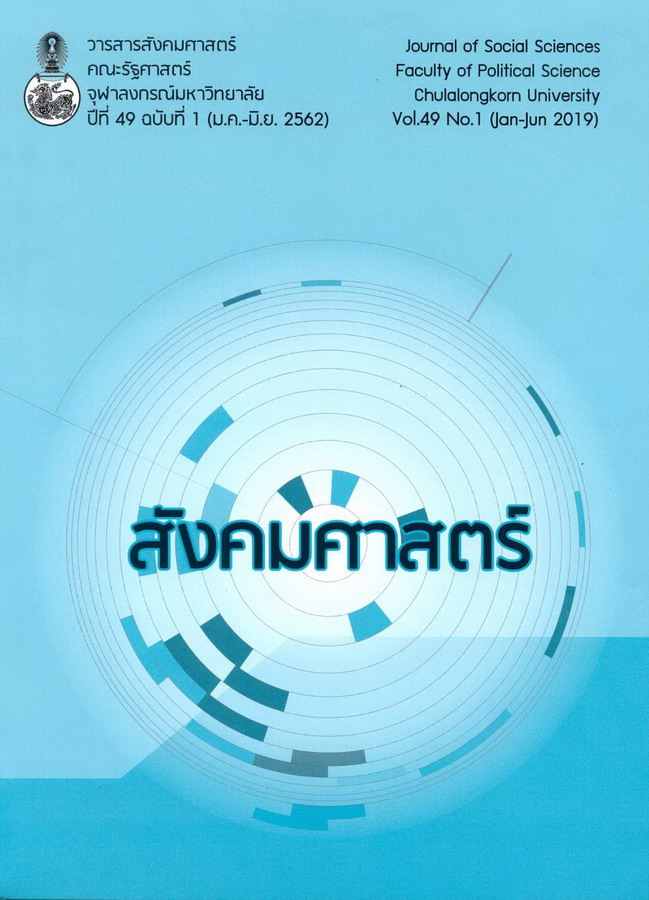การมีส่วนร่วมทางการเมืองในประเทศไทย: การทำให้เป็นประชาธิปไตยด้วยการงบประมาณแบบมีส่วนร่วม
DOI:
https://doi.org/10.61462/cujss.v49i1.735คำสำคัญ:
การทำให้เป็นประชาธิปไตย, การงบประมาณแบบมีส่วนร่วม, ประชาธิปไตยแบบมีส่วนร่วมบทคัดย่อ
งานวิจัยเชิงคุณภาพนี้มีวัตถุประสงค์สามประการ คือ 1) เพื่อศึกษาสภาพการมีส่วนร่วมในกระบวนการงบประมาณขององค์กรปกครองส่วนท้องถิ่นในประเทศไทย 2)เพื่อวิเคราะห์บทบาทของการงบประมาณแบบมีส่วนร่วมต่อการทำให้เป็นประชาธิปไตย 3) เพื่อนำเสนอรูปแบบที่เหมาะสมของการนำงบประมาณแบบมีส่วนร่วมมาใช้ในประเทศไทย ด้วยการศึกษาจากกรณีศึกษา 3 แห่ง ผลการศึกษาพบว่า แม้ว่าองค์กรปกครองส่วนท้องถิ่นได้ส่งเสริมให้เกิดการมีส่วนร่วมในการบริหารงานแล้วก็ตาม แต่กระบวนการจัดทำงบประมาณยังไม่เป็นไปตามหลักการของการงบประมาณแบบมีส่วนร่วมตามที่ได้ดำเนินการในประเทศต้นแบบหลายประเทศ โดยเฉพาะอย่างยิ่งคือไม่ได้ใช้กระบวนการปรึกษาหารือในการตัดสินใจกำหนดงบประมาณ อย่างไรก็ตามการงบประมาณแบบมีส่วนร่วมมีโอกาสนำมาซึ่งผลลัพธ์ที่พึงปรารถนาซึ่งสอดคล้องกับหลักการทำให้เป็นประชาธิปไตย และเพื่อให้บรรลุเป้าประสงค์จำเป็นต้องอาศัยความร่วมมือจากทุกฝ่าย ปรับทัศนคติของผู้เกี่ยวข้อง ตลอดจนการพัฒนากลไกทางกฎหมายที่เหมาะสม
Downloads
เอกสารอ้างอิง
Chai-anan Samudavanija.1987. Panha Khong Kanphatthana Thang Kanmueang Thai. [Problems of Political Development in Thailand]. Bangkok: Chulalongkorn Univeristy Press. (in Thai)
Chai-anan Samudavanija. 2001. “Thailand: A Stable Semi - Democracy.” In Thailand: State-Building, Democracy and Globalization, edited by Chai-Anan Samudavaniha,189-196. Bangkok: Institute for Public Policy Studies.
Dias, Nelson. 2014. “25 Years of Participatory Budget in the World: A New Social and Political Movement?” In Hope for Democracy: 25 Years of Participatory Budgeting Worldwide, edited by Nelson Dias, 21-27. Sao Bras de Alportel: In Loco Association.
Folscher, Alra. 2007. “Participatory Budgeting in Asia.” In Participatory Budgeting, edited by Anwar Shah, 157-188. Washington DC: The World Bank.
Gilman, Hollie R. 2016. Engaging Citizens: Participatory Budgeting and the Inclusive Governance Movement within the United States. Ash Center for Democratic Governance and Innovation, Harvard Kennedy School.
Harriss, John, Kristian Stokke, and Olle Tornquist. 2005. “Introduction: The New Local Politics of Democratisation.” In Politicising Democracy: The New Local Politics of Democratisation, edited by John Harriss, Kristian Stokke and Olle Tornquist, 201-225. New York: Palgrave Macmillan.
Huntington, Samuel Phillips. 1984. “Will More Countries Become Democratic.” Political Science Quarterly 99(2): 193-218.
Likhit Dhiravegin. 2003. “Ratthathammanun- Kanpatirup Kanmueang Lae Kanborihan.” [Constitutions: Political and Administrative Reforms]. King Prajadhipok's Insitute Journal 1(1): 1-29. (in Thai)
Nithi Eawsriwong. 1993. “Watthanatham Khong Khon Chan Klang Khong Thai.” [The Cultures of Middle Class Thai]. In The Middle Class on Thai Democratic Stream, edited by Pasuk Phongpaichit, 60-65. Bangkok: 179 Press. (in Thai)
Serageldin, Mona, John Driscoll, Liz Melendez San Miguel, Luis Valenzuela, and Consuelo Bravo. 2005. Assessment of Participatory Budgeting in Brazil. Cambridge, MA: Center for Urban Development Studies, Graduate School of Design, Harvard University.
Shah, Anwar. 2007. “Overview.” In Participatory Budgeting, edited by Anwar Shah, 1-20. Washington DC: The World Bank.
Stortone, Stefano. 2010. "Participatory Budgeting: Heading Towards a Civil Democracy". In A Panacea for All Seasons?: Civil Society and Governance in Europe (European Civil Society), edited by M. Freise, M. Pyykkönen and E. Vaidelyte, 99-121. Baden-Baden: Nomos.
Suchit Bunbongkarn. 1988. Kan Mi Suanruam Thang Kanmueang Khong Thai. [Political Participation in Thailand]. Bangkok: Chulalongkorn University Press. (in Thai)
-----.1994. Kanphatthana Thang Kanmueang Khong Thai: Patisamphan Rawang Thahan Sathaban Thang Kanmueang Lae Kan Mi Suanruam Thang Kanmueang Khong Prachachon. [Thai Political Development: Interactions between the Military, Political Institutions and Popular Political Participation]. Bangkok: Chulalongkorn University Press. (in Thai)
-----. 2012. “Authoritarianism, Democracy and the Monarchy”. In Monarchy and Constitutional Rule in Democratizing Thailand, edited by Suchit Bunbongkarn, 203-249. Bangkok: Institute of Thai Studies, Chulalongkorn University.
Tilly, Charles. 2007. Democracy. Cambridge: Cambridge University Press.
Tippawan Lorsuwannarat. 2013. “Ngoppraman Baep Mi Suanruam: Botrian Chak Tangprathet Lae Khwamthathai Samrap Prathet Thai.” [Participatory Budgeting: Lessons Learned from Foreign Countries and Challenges for Thailand]. Journal of Public and Private Management 20(1): 9-39.
Tornquist, Olle. 2005. “The Political Deficit of Substantial Democratisation”. In Politicising Democracy: The New Local Politics of Democratisation, edited by John Harriss, Kristian Stokke and Olle Tornquist, 201-225. New York: Palgrave Macmillan.
Wampler, Brian. 2008. “Participatary Budgeting in Brazil: Contestation, Cooperation, and Accountability.” The City University of New York 41(1): 63-81.
Wampler, Brian. 2010. “Participatory Budgeting: Core Principles and Key Impacts.” Journal of Public Deliberation 8(2): 1-13.
Willoughby, Katherine G. 2014. Public Budgeting in Context. San Francisco: Jossey-Bass.
Yala Province. Yala City Municipality. Division of Technical Services and Planning. 2015. "Phaen Phatthana Sam Pi Thetsaban Nakhon Yala." [Three-Year Development Plan (B.E.2559-2561) Yala City Municipality]. Yala Province: The Municipality. (in Thai)
ดาวน์โหลด
เผยแพร่แล้ว
รูปแบบการอ้างอิง
ฉบับ
ประเภทบทความ
สัญญาอนุญาต
ลิขสิทธิ์ (c) 2019 คณะรัฐศาสตร์ จุฬาลงกรณ์มหาวิทยาลัย

อนุญาตภายใต้เงื่อนไข Creative Commons Attribution-NonCommercial-NoDerivatives 4.0 International License.
เงื่อนไขการอนุญาตสาธารณะ
นโยบายลิขสิทธิ์และการอนุญาต
วารสารสังคมศาสตร์ จุฬาลงกรณ์มหาวิทยาลัย เผยแพร่เนื้อหาทั้งหมดภายใต้ สัญญาอนุญาตครีเอทีฟคอมมอนส์แบบแสดงที่มา-ไม่ใช้เพื่อการค้า-ไม่ดัดแปลง 4.0 นานาชาติ (CC BY-NC-ND 4.0)
ลิขสิทธิ์
บทความทั้งหมดที่ตีพิมพ์ในวารสารสังคมศาสตร์ จุฬาลงกรณ์มหาวิทยาลัย เป็นลิขสิทธิ์ของ คณะรัฐศาสตร์ จุฬาลงกรณ์มหาวิทยาลัย ผู้เขียนจะโอนสิทธิ์ทั้งหมดให้แก่วารสารเมื่อบทความได้รับการตอบรับให้ตีพิมพ์
สัญญาอนุญาต CC BY-NC-ND 4.0
ภายใต้สัญญาอนุญาตนี้:
-
แสดงที่มา (BY): ผู้ใช้ต้องแสดงที่มาโดยอ้างอิงถึงผู้เขียน คณะรัฐศาสตร์ จุฬาลงกรณ์มหาวิทยาลัย และวารสารสังคมศาสตร์ จุฬาลงกรณ์มหาวิทยาลัย พร้อมทั้งให้ลิงก์ไปยังสัญญาอนุญาต และระบุหากมีการเปลี่ยนแปลง ทั้งนี้สามารถทำได้ในลักษณะที่สมเหตุสมผล แต่ต้องไม่ทำในลักษณะที่แสดงว่าผู้อนุญาตให้การรับรองผู้ใช้หรือการใช้งานดังกล่าว
-
ไม่ใช้เพื่อการค้า (NC): ผู้ใช้ไม่สามารถใช้เนื้อหาเพื่อวัตถุประสงค์ทางการค้า การใช้งานเชิงพาณิชย์จะต้องได้รับอนุญาตเป็นลายลักษณ์อักษรล่วงหน้าจากผู้เขียนและคณะรัฐศาสตร์ จุฬาลงกรณ์มหาวิทยาลัย
-
ไม่ดัดแปลง (ND): หากผู้ใช้นำเนื้อหาไปรวม ดัดแปลง หรือต่อยอด ผู้ใช้ไม่สามารถเผยแพร่งานที่ดัดแปลงนั้นได้ การดัดแปลงผลงานจะต้องได้รับอนุญาตเป็นลายลักษณ์อักษรล่วงหน้าจากผู้เขียนและคณะรัฐศาสตร์ จุฬาลงกรณ์มหาวิทยาลัย
นโยบายการเข้าถึงแบบเปิด
วารสารสังคมศาสตร์ จุฬาลงกรณ์มหาวิทยาลัย ให้การเข้าถึงเนื้อหาแบบเปิดโดยทันทีตามหลักการที่ว่าการทำให้งานวิจัยสามารถเข้าถึงได้อย่างเสรีแก่สาธารณะจะสนับสนุนการแลกเปลี่ยนความรู้ในระดับโลก ผู้ใช้สามารถอ่าน ดาวน์โหลด คัดลอก เผยแพร่ พิมพ์ ค้นหา หรือเชื่อมโยงไปยังเนื้อหาฉบับเต็มของบทความได้โดยไม่ต้องขออนุญาตล่วงหน้าจากผู้จัดพิมพ์หรือผู้เขียน ทั้งนี้เป็นไปตามสัญญาอนุญาต CC BY-NC-ND 4.0
นโยบายการเก็บบันทึกด้วยตนเอง
ผู้เขียนสามารถเก็บบันทึกบทความฉบับตีพิมพ์สุดท้าย ต้นฉบับที่ส่ง (preprint) หรือฉบับที่ผ่านการประเมิน (postprint) ในคลังสถาบันหรือเว็บไซต์ส่วนตัวได้ โดยต้องมีการอ้างอิงการตีพิมพ์ครั้งแรกในวารสารสังคมศาสตร์ จุฬาลงกรณ์มหาวิทยาลัย พร้อมระบุแหล่งอ้างอิงที่สมบูรณ์และลิงก์ไปยังเว็บไซต์ของวารสาร
การขออนุญาต
สำหรับการใช้งานนอกเหนือจากที่ครอบคลุมโดยสัญญาอนุญาต CC BY-NC-ND 4.0 กรุณาติดต่อ:
กองบรรณาธิการ
วารสารสังคมศาสตร์ จุฬาลงกรณ์มหาวิทยาลัย
คณะรัฐศาสตร์ จุฬาลงกรณ์มหาวิทยาลัย
Email: cusocscij@gmail.com
สำหรับข้อมูลเพิ่มเติมเกี่ยวกับสัญญาอนุญาตครีเอทีฟคอมมอนส์แบบแสดงที่มา-ไม่ใช้เพื่อการค้า-ไม่ดัดแปลง 4.0 นานาชาติ กรุณาเยี่ยมชม: https://creativecommons.org/licenses/by-nc-nd/4.0/deed.th





